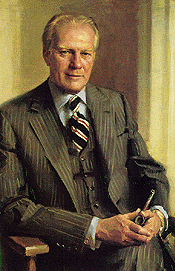
|

|
It was indeed an unprecedented time. He had been the first Vice President chosen under the terms of the Twenty-fifth Amendment and, in the aftermath of the Watergate scandal, was succeeding the first President ever to resign. Ford was confronted with almost insuperable tasks. There were the challenges of mastering inflation, reviving a depressed economy, solving chronic energy shortages, and trying to ensure world peace.
The President acted to curb the trend toward Government intervention and spending as a means of solving the problems of American society and the economy. In the long run, he believed, this shift would bring a better life for all Americans.
Ford's reputation for integrity and openness had made him popular during his 25 years in Congress. From 1965 to 1973, he was House Minority Leader. Born in Omaha, Nebraska, in 1913, he grew up in Grand Rapids, Michigan. He starred on the University of Michigan football team, then went to Yale, where he served as assistant coach while earning his law degree. During World War II he attained the rank of lieutenant commander in the Navy. After the war he returned to Grand Rapids, where he began the practice of law, and entered Republican politics. A few weeks before his election to Congress in 1948, he married Elizabeth Bloomer. They have four children: Michael, John, Steven, and Susan.
As President, Ford tried to calm earlier controversies by granting former President Nixon a full pardon. His nominee for Vice President, former Governor Nelson Rockefeller of New York, was the second person to fill that office by appointment. Gradually, Ford selected a cabinet of his own.
Ford established his policies during his first year in office, despite opposition from a heavily Democratic Congress. His first goal was to curb inflation. Then, when recession became the Nation's most serious domestic problem, he shifted to measures aimed at stimulating the economy. But, still fearing inflation, Ford vetoed a number of non-military appropriations bills that would have further increased the already heavy budgetary deficit. During his first 14 months as President he vetoed 39 measures. His vetoes were usually sustained.
Ford continued as he had in his Congressional days to view himself as "a moderate in domestic affairs, a conservative in fiscal affairs, and a dyed-in-the-wool internationalist in foreign affairs." A major goal was to help business operate more freely by reducing taxes upon it and easing the controls exercised by regulatory agencies. "We...declared our independence 200 years ago, and we are not about to lose it now to paper shufflers and computers," he said. In foreign affairs Ford acted vigorously to maintain U. S. power and prestige after the collapse of Cambodia and South Viet Nam. Preventing a new war in the Middle East remained a major objective; by providing aid to both Israel and Egypt, the Ford Administration helped persuade the two countries to accept an interim truce agreement. Detente with the Soviet Union continued. President Ford and Soviet leader Leonid I. Brezhnev set new limitations upon nuclear weapons.
President Ford won the Republican nomination for the Presidency in 1976, but lost the election to his Democratic opponent, former Governor Jimmy Carter of Georgia.
On Inauguration Day, President Carter began his speech: "For myself and for our Nation, I want to thank my predecessor for all he has done to heal our land." A grateful people concurred.


|
He was born in Cuyahoga County, Ohio, in 1831. Fatherless at two, he later drove canal boat teams, somehow earning enough money for an education. He was graduated from Williams College in Massachusetts in 1856, and he returned to the Western Reserve Eclectic Institute (later Hiram College) in Ohio as a classics professor. Within a year he was made its president.
Garfield was elected to the Ohio Senate in 1859 as a Republican. During the secession crisis, he advocated coercing the seceding In 1862, when Union military victories had been few, he successfully led a brigade at Middle Creek, Kentucky, against Confederate troops. At 31, Garfield became a brigadier general, two years later a major general of volunteers.
Meanwhile, in 1862, Ohioans elected him to Congress. President Lincoln persuaded him to resign his commission: It was easier to find major generals than to obtain effective Republicans for Congress. Garfield repeatedly won re-election for 18 years, and became the leading Republican in the House.
At the 1880 Republican Convention, Garfield failed to win the Presidential nomination for his friend John Sherman. Finally, on the 36th ballot, Garfield himself became the "dark horse" nominee. By a margin of only 10,000 popular votes, Garfield defeated the Democratic nominee, Gen. Winfield Scott Hancock.
As President, Garfield strengthened Federal authority over the New York Customs House, stronghold of Senator Roscoe Conkling, who was leader of the Stalwart Republicans and dispenser of patronage in New York. When Garfield submitted to the Senate a list of appointments including many of Conkling's friends, he named Conkling's arch-rival William H. Robertson to run the Customs House. Conkling contested the nomination, tried to persuade the Senate to block it, and appealed to the Republican caucus to compel its withdrawal.
But Garfield would not submit: "This...will settle the question whether the President is registering clerk of the Senate or the Executive of the United States.... shall the principal port of entry ... be under the control of the administration or under the local control of a factional senator."
Conkling maneuvered to have the Senate confirm Garfield's uncontested nominations and adjourn without acting on Robertson. Garfield countered by withdrawing all nominations except Robertson's; the Senators would have to confirm him or sacrifice all the appointments of Conkling's friends.
In a final desperate move, Conkling and his fellow-Senator from New York resigned, confident that their legislature would vindicate their stand and re-elect them. Instead, the legislature elected two other men; the Senate confirmed Robertson. Garfield's victory was complete.
In foreign affairs, Garfield's Secretary of State invited all American republics to a conference to meet in Washington in 1882. But the conference never took place. On July 2, 1881, in a Washington railroad station, an embittered attorney who had sought a consular post shot the President.
Mortally wounded, Garfield lay in the White House for weeks. Alexander Graham Bell, inventor of the telephone, tried unsuccessfully to find the bullet with an induction-balance electrical device which he had designed. On September 6, Garfield was taken to the New Jersey seaside. For a few days he seemed to be recuperating, but on September 19, 1881, he died from an infection and internal hemorrhage.

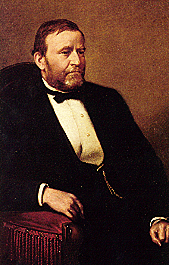
|
Born in 1822, Grant was the son of an Ohio tanner. He went to West Point rather against his will and graduated in the middle of his class. In the Mexican War he fought under Gen. Zachary Taylor.
At the outbreak of the Civil War, Grant was working in his father's leather store in Galena, Illinois. He was appointed by the Governor to command an unruly volunteer regiment. Grant whipped it into shape and by September 1861 he had risen to the rank of brigadier general of volunteers.
He sought to win control of the Mississippi Valley. In February 1862 he took Fort Henry and attacked Fort Donelson. When the Confederate commander asked for terms, Grant replied, "No terms except an unconditional and immediate surrender can be accepted." The Confederates surrendered, and President Lincoln promoted Grant to major general of volunteers.
At Shiloh in April, Grant fought one of the bloodiest battles in the West and came out less well. President Lincoln fended off demands for his removal by saying, "I can't spare this man--he fights." For his next major objective, Grant maneuvered and fought skillfully to win Vicksburg, the key city on the Mississippi, and thus cut the Confederacy in two. Then he broke the Confederate hold on Chattanooga.
Lincoln appointed him General-in-Chief in March 1864. Grant directed Sherman to drive through the South while he himself, with the Army of the Potomac, pinned down Gen. Robert E. Lee's Army of Northern Virginia.
Finally, on April 9, 1865, at Appomattox Court House, Lee surrendered. Grant wrote out magnanimous terms of surrender that would prevent treason trials.
As President, Grant presided over the Government much as he had run the Army. Indeed he brought part of his Army staff to the White House.
Although a man of scrupulous honesty, Grant as President accepted handsome presents from admirers. Worse, he allowed himself to be seen with two speculators, Jay Gould and James Fisk. When Grant realized their scheme to corner the market in gold, he authorized the Secretary of the Treasury to sell enough gold to wreck their plans, but the speculation had already wrought havoc with business.
During his campaign for re-election in 1872, Grant was attacked by Liberal Republican reformers. He called them "narrow-headed men," their eyes so close together that "they can look out of the same gimlet hole without winking." The General's friends in the Republican Party came to be known proudly as "the Old Guard." Grant allowed Radical Reconstruction to run its course in the South, bolstering it at times with military force.
After retiring from the Presidency, Grant became a partner in a financial firm, which went bankrupt. About that time he learned that he had cancer of the throat. He started writing his recollections to pay off his debts and provide for his family, racing against death to produce a memoir that ultimately earned nearly $450,000. Soon after completing the last page, in 1885, he died.

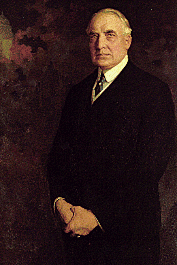
|
Thirty-one distinguished Republicans had signed a manifesto assuring voters that a vote for Harding was a vote for the League. But Harding interpreted his election as a mandate to stay out of the
Harding, born near Marion, Ohio, in 1865, became the publisher of a newspaper. He married a divorcee, Mrs. Florence Kling De Wolfe. He was a trustee of the Trinity Baptist Church, a director of almost every important business, and a leader in fraternal organizations and charitable enterprises.
He organized the Citizen's Cornet Band, available for both Republican and Democratic rallies; "I played every instrument but the slide trombone and the E-flat cornet," he once remarked. Harding's undeviating Republicanism and vibrant speaking voice, plus his willingness to let the machine bosses set policies, led him far in Ohio politics. He served in the state Senate and as Lieutenant Governor, and unsuccessfully ran for Governor. He delivered the nominating address for President Taft at the 1912 Republican Convention. In 1914 he was elected to the Senate, which he found "a very pleasant place."
An Ohio admirer, Harry Daugherty, began to promote Harding for the 1920 Republican nomination because, he later explained, "He looked like a President."
Thus a group of Senators, taking control of the 1920 Republican Convention when the principal candidates deadlocked, turned to Harding. He won the Presidential election by an unprecedented landslide of 60 percent of the popular vote.
Republicans in Congress easily got the President's signature on their bills. They eliminated wartime controls and slashed taxes, established a Federal budget system, restored the high protective tariff, and imposed tight limitations upon immigration. By 1923 the postwar depression seemed to be giving way to a new surge of prosperity, and newspapers hailed Harding as a wise statesman carrying out his campaign promise--"Less government in business and more business in government."
Behind the facade, not all of Harding's Administration was so impressive. Word began to reach the President that some of his friends were using their official positions for their own enrichment. Alarmed, he complained, "My...friends...they're the ones that keep me walking the floors nights!"
Looking wan and depressed, Harding journeyed westward in the summer of 1923, taking with him his upright Secretary of Commerce, Herbert Hoover. "If you knew of a great scandal in our administration," he asked Hoover, "would you for the good of the country and the party expose it publicly or would you bury it?" Hoover urged publishing it, but Harding feared the political repercussions.
He did not live to find out how the public would react to the scandals of his administration. In August of 1923, he died in San Francisco of a heart attack.

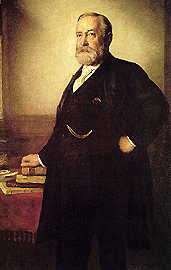
|
Born in 1833 on a farm by the Ohio River below Cincinnati, Harrison attended Miami University in Ohio and read law in Cincinnati. He moved to Indianapolis, where he practiced law and campaigned for the Republican Party. He married Caroline Lavinia Scott in 1853. After the Civil War--he was Colonel of the 70th Volunteer Infantry--Harrison became a pillar of Indianapolis, enhancing his reputation as a brilliant lawyer.
The Democrats defeated him for Governor of Indiana in 1876 by unfairly stigmatizing him as "Kid Gloves" Harrison. In the 1880's he served in the United States Senate, where he championed Indians. homesteaders, and Civil War veterans.
In the Presidential election, Harrison received 100,000 fewer popular votes than Cleveland, but carried the Electoral College 233 to 168. Although Harrison had made no political bargains, his supporters had given innumerable pledges upon his behalf. When Boss Matt Quay of Pennsylvania heard that Harrison ascribed his narrow victory to Providence, Quay exclaimed that Harrison would never know "how close a number of men were compelled to approach... the penitentiary to make him President." Harrison was proud of the vigorous foreign policy which he helped shape. The first Pan American Congress met in Washington in 1889, establishing an information center which later became the Pan American Union. At the end of his administration Harrison submitted to the Senate a treaty to annex Hawaii; to his disappointment, President Cleveland later withdrew it.
Substantial appropriation bills were signed by Harrison for internal improvements, naval expansion, and subsidies for steamship lines. For the first time except in war, Congress appropriated a billion dollars. When critics attacked "the billion-dollar Congress," Speaker Thomas B. Reed replied, "This is a billion-dollar country." President Harrison also signed the Sherman Anti-Trust Act "to protect trade and commerce against unlawful restraints and monopolies," the first Federal act attempting to regulate trusts.
The most perplexing domestic problem Harrison faced was the tariff issue. The high tariff rates in effect had created a surplus of money in the Treasury. Low-tariff advocates argued that the surplus was hurting business. Republican leaders in Congress successfully met the challenge. Representative William McKinley and Senator Nelson W. Aldrich framed a still higher tariff bill; some rates were intentionally prohibitive.
Harrison tried to make the tariff more acceptable by writing in reciprocity provisions. To cope with the Treasury surplus, the tariff was removed from imported raw sugar; sugar growers within the United States were given two cents a pound bounty on their production.
Long before the end of the Harrison Administration, the Treasury surplus had evaporated, and prosperity seemed about to disappear as well. Congressional elections in 1890 went stingingly against the Republicans, and party leaders decided to abandon President Harrison although he had cooperated with Congress on party legislation. Nevertheless, his party renominated him in 1892, but he was defeated by Cleveland.
After he left office, Harrison returned to Indianapolis, and married the widowed Mrs. Mary Dimmick in 1896. A dignified elder statesman, he died in 1901.

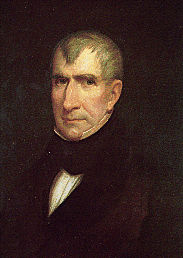
|
Harrison was in fact a scion of the Virginia planter aristocracy. He was born at Berkeley in 1773. He studied classics and history at Hampden-Sydney College, then began the study of medicine in Richmond.
Suddenly, that same year, 1791, Harrison switched interests. He obtained a commission as ensign in the First Infantry of the Regular Army, and headed to the Northwest, where he spent much of his life.
In the campaign against the Indians, Harrison served as aide-de-camp to General "Mad Anthony" Wayne at the Battle of Fallen Timbers, which opened most of the Ohio area to settlement. After resigning from the Army in 1798, he became Secretary of the Northwest Territory, was its first delegate to Congress, and helped obtain legislation dividing the Territory into the Northwest and Indiana Territories. In 1801 he became Governor of the Indiana Territory, serving 12 years.
His prime task as governor was to obtain title to Indian lands so settlers could press forward into the wilderness. When the Indians retaliated, Harrison was responsible for defending the settlements. The threat against settlers became serious in 1809. An eloquent and energetic chieftain, Tecumseh, with his religious brother, the Prophet, began to strengthen an Indian confederation to prevent further encroachment. In 1811 Harrison received permission to attack the confederacy.
While Tecumseh was away seeking more allies, Harrison led about a thousand men toward the Prophet's town. Suddenly, before dawn on November 7, the Indians attacked his camp on Tippecanoe River. After heavy fighting, Harrison repulsed them, but suffered 190 dead and wounded.
The Battle of Tippecanoe, upon which Harrison's fame was to rest, disrupted Tecumseh's confederacy but failed to diminish Indian raids. By the spring of 1812, they were again terrorizing the frontier.
In the War of 1812 Harrison won more military laurels when he was given the command of the Army in the Northwest with the rank of brigadier general. At the Battle of the Thames, north of Lake Erie, on October 5, 1813, he defeated the combined British and Indian forces, and killed Tecumseh. The Indians scattered, never again to offer serious resistance in what was then called the Northwest. Thereafter Harrison returned to civilian life; the Whigs, in need of a national hero, nominated him for President in 1840. He won by a majority of less than 150,000, but swept the Electoral College, 234 to 60.
When he arrived in Washington in February 1841, Harrison let Daniel Webster edit his Inaugural Address, ornate with classical allusions. Webster obtained some deletions, boasting in a jolly fashion that he had killed "seventeen Roman proconsuls as dead as smelts, every one of them."
Webster had reason to be pleased, for while Harrison was nationalistic in his outlook, he emphasized in his Inaugural that he would be obedient to the will of the people as expressed through Congress.
But before he had been in office a month, he caught a cold that developed into pneumonia. On April 4, 1841, he died--the first President to die in office--and with him died the Whig program.
